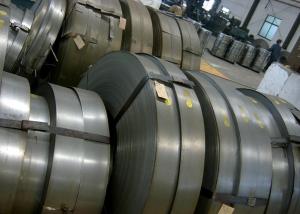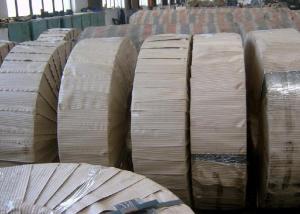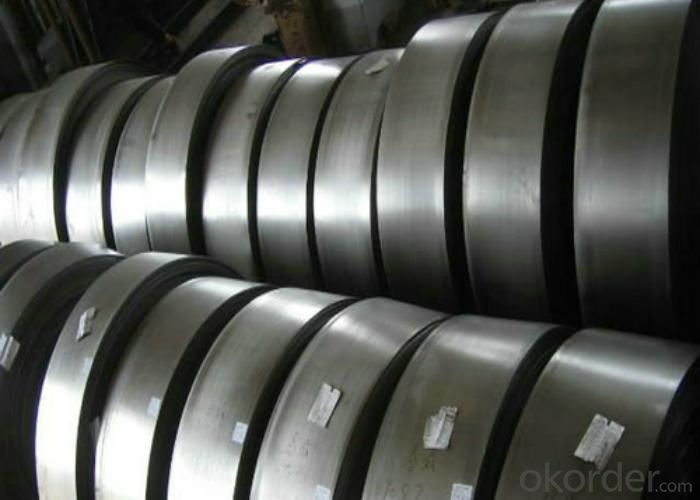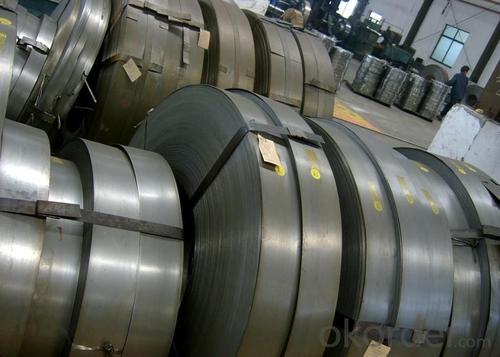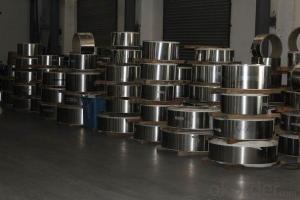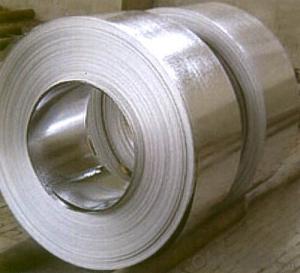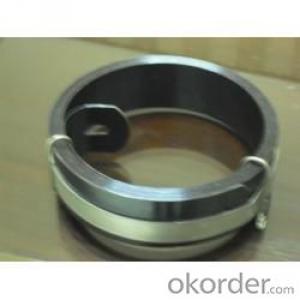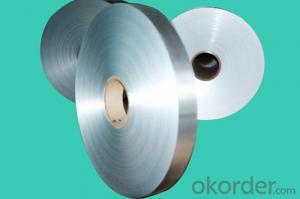Spring Steel Strip
- Loading Port:
- China Main Port
- Payment Terms:
- TT or LC
- Min Order Qty:
- 50MT m.t.
- Supply Capability:
- 600000TONS/YEAR m.t./month
OKorder Service Pledge
OKorder Financial Service
You Might Also Like
Spring Steel:
Spring steel is divided into two types, one is alloy spring steel, and other one is carbon spring steel.
Alloy spring steel is a type that is used for manufacturing springs and other elastic parts. Spring steel should have high elastic limit and ratio of yield strength and tensile strength to make sure that the springs obtain enough power of elastic deformation and can bear much load.
Types of alloy spring steel: Si-Mn spring steel, Si-Cr spring steel, Cr-Mn Spring steel, Cr-V spring steel and so on.
Specification of Spring Steel Strip
-Material: 50CrVA
-Standard: GB/T 1222-2007
-Type: Spring Steel
Corresponding Steel Grade for Reference:
CHN, GB | JPN, JIS | GER, DIN |
50CrVA | SUP10 | 50CrV4 |
GBR, BS | FRA,FN | |
735A51 | 50CV4 |
Chemical Composition:
C | Si | Mn |
0.46~0.54 | 0.17~0.37 | 0.50~0.80 |
S | P | Cr |
≤0.030 | ≤0.030 | 0.80~1.10 |
Ni | Cu | V |
≤0.35 | ≤0.25 | 0.10~0.20 |
Mechanical Properties:
-Tensile Strength σb (MPa): ≥1274 (130)
-Yield Strength σs (MPa): ≥1127 (115)
-Elongation δ5 (%):≥10
-Percentage reduction of area: ψ (%): ≥40
-Hardness:
1, Hot rolled, ≤321HB
2, Cold drawn + Heat treatment: ≤321HB
-Norm of heat treatment:
1, Quenching: 850℃±20℃.
2, Cooled by oil.
3, Tempering: 500℃±50℃.
Usage/Applications of Spring Steel Strip
-Mechanical Properties are good. 50CrVA have high hardenability. The element V reduces thermal sensitivity and improves the strength and toughness. The fatigue strength and yield point are high but the weld ability is bad.
-50CrVA is a nice material of spring. Usually it’s used as valve spring, piston spring and secure valve spring with big section that can bear much load. The working temperature is below 300℃
Packaging & Delivery of Spring Steel Strip:
-Packing Detail: The products will be well packed.
-Marks:
1, Tag marks. To show customers the specifications of products, company name and logo and other information required by customers.
2, Color marks. It’s easy for customers to distinguish them from other products at destination port.
-Delivery Detail: 30~45 working days after receive buyer’s T.T. or L/C.
Payment:
-Theoretical weight/Actual weight.
-FOB, CFR or CIF.
-Terms of payment: T.T. or L/C at sight.
Photos of Spring Steel Strip:
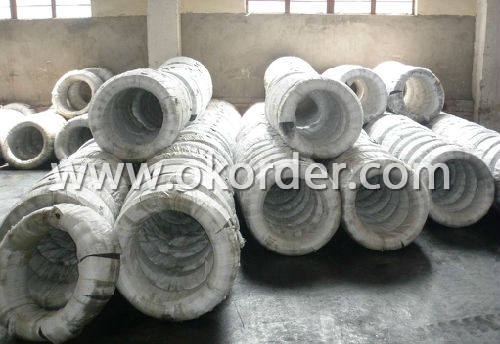
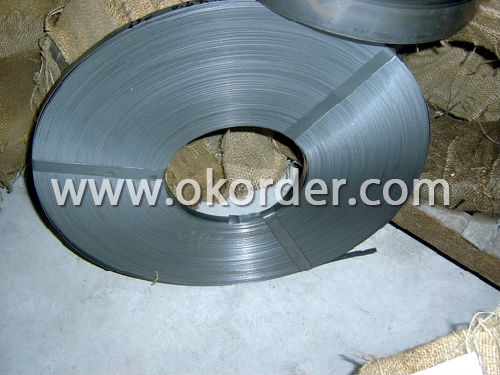
- Q: What are the main applications of special steel in the energy storage industry?
- Special steel is extensively used in the energy storage industry for various applications. Some of the main applications include the manufacturing of high-performance battery components, such as battery casings, terminals, and current collectors. Special steel is also used in the production of energy storage system components like fuel cells, hydrogen storage tanks, and pressure vessels. Additionally, special steel is utilized in the construction of infrastructure for energy storage facilities, such as pipelines, storage tanks, and structural supports. Overall, special steel plays a vital role in enabling efficient and durable energy storage systems in the industry.
- Q: What are the main factors affecting the hardness of special steel?
- The hardness of special steel is influenced by various factors. Let's explore some of the key ones: 1. Carbon content plays a vital role in determining the hardness of steel. The addition of carbon, known as a hardening element, enhances the strength and hardness. Generally, higher carbon content leads to increased hardness. 2. The presence of alloying elements like chromium, manganese, nickel, and tungsten also impacts the hardness of special steel. These elements interact with the steel, forming compounds and solid solutions that enhance hardness and strength. 3. The hardness of steel is significantly affected by the heat treatment process. This involves subjecting the steel to specific heating and cooling cycles. Quenching, a rapid cooling process, transforms the microstructure of the steel, resulting in increased hardness. On the other hand, tempering reduces hardness while improving toughness. 4. The crystal structure of the steel can also influence its hardness. For instance, during quenching, the formation of martensite, a hard and brittle structure, increases hardness. Alternatively, crystal structures like ferrite or pearlite may exhibit lower hardness. 5. The size of grains within the steel's microstructure can impact its hardness. Smaller grain sizes generally lead to higher hardness due to improved strength and limited dislocation movement within the material. 6. Work hardening, which occurs through processes like rolling or forging, can increase the hardness of steel. This phenomenon happens when dislocations in the crystal lattice become trapped and hinder further dislocation movement, resulting in increased hardness. 7. The presence of impurities or non-metallic inclusions in steel can affect its hardness. These impurities can act as stress concentrators, reducing the material's hardness. To achieve the desired hardness for specific applications, it is crucial to consider and carefully control these factors during the manufacturing process of special steel.
- Q: What are the properties of cobalt-based alloys?
- Cobalt-based alloys typically exhibit excellent corrosion resistance, high strength, and good wear resistance. They also have high temperature stability, making them suitable for use in high-temperature applications. Additionally, these alloys have magnetic properties, allowing them to be used in electromagnetic applications.
- Q: What are the properties of shock-resistant steel?
- Shock-resistant steel, also known as impact-resistant steel, possesses several key properties that make it highly resistant to sudden impacts or shock loads. These properties include high toughness, excellent strength, and superior ductility. Shock-resistant steel is designed to absorb and distribute the energy generated from an impact, thereby preventing fractures or failure. It can withstand sudden forces without deforming or breaking, making it ideal for applications in industries such as construction, automotive, and aerospace, where impact resistance is crucial.
- Q: How does special steel contribute to the aerospace industry?
- Special steel contributes to the aerospace industry by providing excellent strength, durability, and high-temperature resistance. It is crucial in manufacturing aircraft components such as engine parts, landing gear, and structural elements. Special steel's unique properties enable lighter and more fuel-efficient aircraft, enhancing performance and reducing maintenance costs. Additionally, its corrosion resistance ensures the longevity and safety of aerospace structures, making it an essential material in the industry.
- Q: What are the different surface hardening techniques used for special steel?
- Some of the different surface hardening techniques used for special steel include case hardening, nitriding, carburizing, and induction hardening.
- Q: How does special steel contribute to the manufacturing of automotive engine components?
- Special steel plays a crucial role in the manufacturing of automotive engine components as it offers exceptional strength, durability, and heat resistance properties. It allows for the production of lighter and more fuel-efficient engines without compromising on performance. Special steel also ensures reliable and efficient functioning of engine parts, such as pistons, crankshafts, valves, and connecting rods, resulting in improved overall engine performance and longevity.
- Q: What are the different test methods used to evaluate special steel?
- There are several test methods used to evaluate special steel and ensure its quality and performance. Some of the commonly employed test methods include: 1. Tensile Testing: This method measures the steel's ability to withstand tension or pulling forces. It helps determine the ultimate tensile strength, yield strength, and elongation of the steel. 2. Hardness Testing: Hardness tests, such as Rockwell or Brinell tests, evaluate the resistance of special steel to indentation or scratching. It provides an indication of the steel's strength and durability. 3. Impact Testing: This test measures the steel's ability to absorb energy under high-stress conditions. Charpy and Izod tests are commonly used to determine the toughness and resistance of special steel to sudden shocks or impacts. 4. Chemical Analysis: Chemical analysis involves determining the composition of the steel, including the percentage of various elements like carbon, manganese, chromium, and others. This helps ensure that the steel meets the required specifications and standards. 5. Microstructure Evaluation: Microscopic examination of the steel's microstructure can reveal important information about its grain size, phase distribution, and any potential defects or inclusions. Techniques such as optical microscopy or electron microscopy are employed for this purpose. 6. Corrosion Testing: Special steel often needs to withstand harsh environments or corrosive substances. Various corrosion tests, such as salt spray tests or immersion tests, evaluate the steel's resistance to corrosion and degradation. 7. Non-Destructive Testing (NDT): NDT methods, including ultrasonic testing, magnetic particle testing, or eddy current testing, are employed to detect surface or internal defects without damaging the steel. These tests provide valuable information about the steel's structural integrity. 8. Fatigue Testing: Fatigue tests simulate repetitive loading conditions to determine the steel's resistance to cyclic stress. This helps evaluate the steel's durability and ability to withstand long-term usage or repetitive loading. By employing these different test methods, manufacturers and quality control departments can assess the mechanical properties, chemical composition, microstructure, and other important factors of special steel to ensure it meets the required standards and specifications.
- Q: What is the cost of special steel compared to regular steel?
- The cost of special steel is generally higher compared to regular steel due to its higher quality, specific composition, and unique properties, which make it more suitable for specialized applications.
- Q: What are the applications of special steel in the manufacturing supply chain?
- Special steel has various applications in the manufacturing supply chain. It is commonly used in industries such as automotive, aerospace, energy, and construction. Special steel's unique properties, including high strength, durability, and resistance to corrosion and wear, make it ideal for manufacturing components and parts that require exceptional performance under demanding conditions. These applications can range from manufacturing engine components, structural parts, tools, and machinery, to oil and gas pipelines, power generation equipment, and building infrastructure. Special steel plays a crucial role in enhancing the overall efficiency, reliability, and safety of the manufacturing supply chain.
1. Manufacturer Overview
| Location | Jiangsu, China |
| Year Established | 1990 |
| Annual Output Value | Above US$ 20 Million |
| Main Markets | Mid East; Eastern Europe; North America |
| Company Certifications |
2. Manufacturer Certificates
| a) Certification Name | |
| Range | |
| Reference | |
| Validity Period |
3. Manufacturer Capability
| a) Trade Capacity | |
| Nearest Port | Shanghai |
| Export Percentage | 20% - 30% |
| No.of Employees in Trade Department | 21-50 People |
| Language Spoken: | English; Chinese |
| b) Factory Information | |
| Factory Size: | Above 100,000 square meters |
| No. of Production Lines | 1 |
| Contract Manufacturing | OEM Service Offered; |
| Product Price Range | High; Average |
Send your message to us
Spring Steel Strip
- Loading Port:
- China Main Port
- Payment Terms:
- TT or LC
- Min Order Qty:
- 50MT m.t.
- Supply Capability:
- 600000TONS/YEAR m.t./month
OKorder Service Pledge
OKorder Financial Service
Similar products
Hot products
Hot Searches
Related keywords
